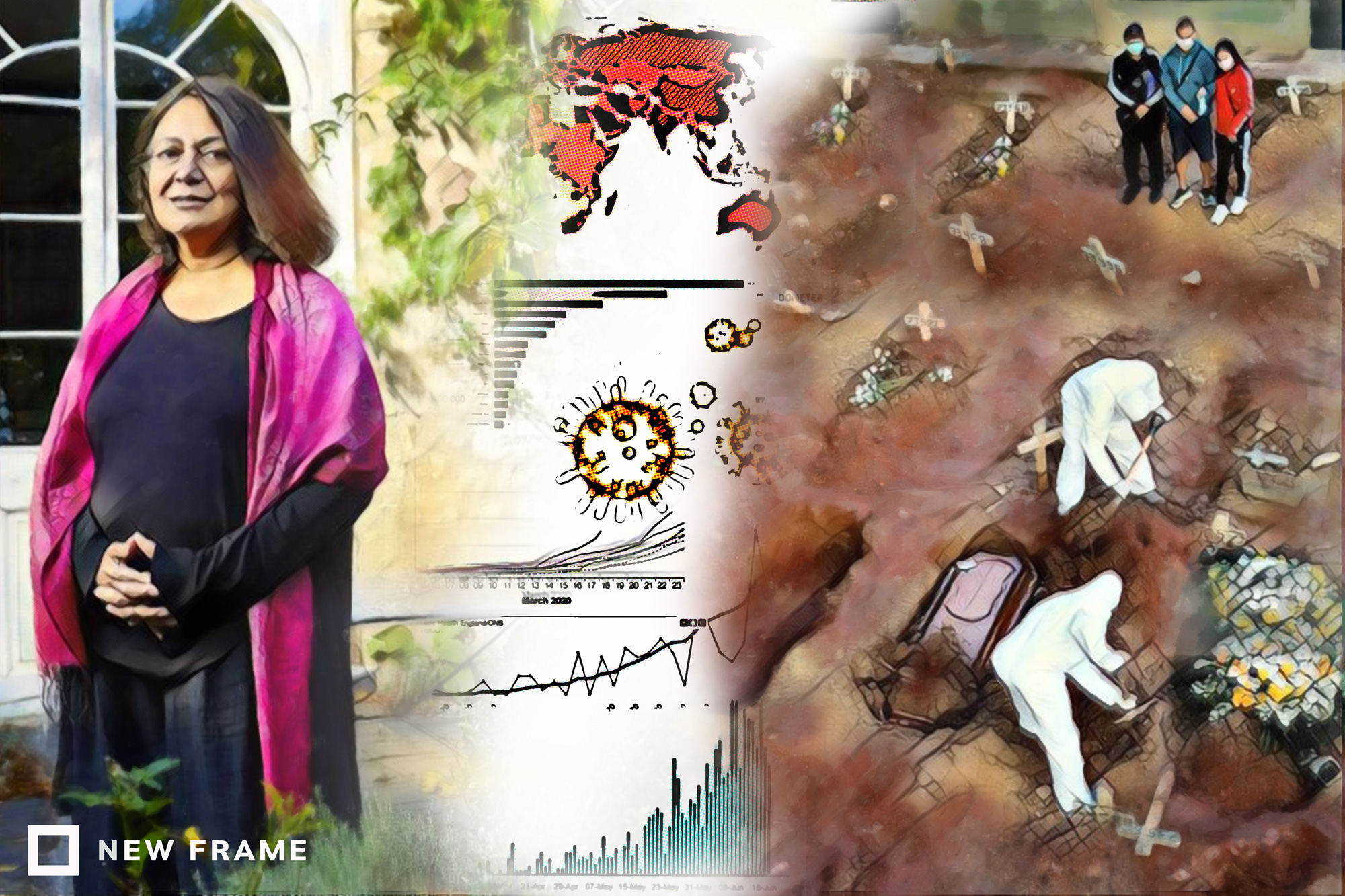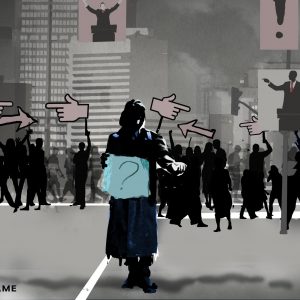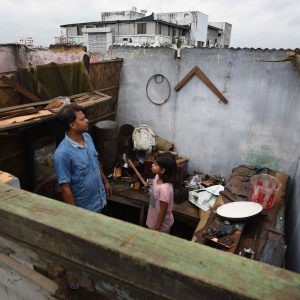Sunetra Gupta and the Covid-19 culture war
Oxford epidemiologist Sunetra Gupta has challenged second-wave Covid-19 lockdowns from a humanitarian position. But her argument has become entangled in a libertarian lobbying campaign.
Author:
21 October 2020

Sunetra Gupta doesn’t think in straight lines. She is a professor of theoretical epidemiology at Oxford University, but she’s also an acclaimed novelist and translator of the great Bengali poet Rabindranath Tagore. When she does Zoom interviews, a zany assemblage perches atop a bookshelf behind her: a shop mannequin sporting a Clockwork Orange-style bowler hat.
Her scientific life and her literary life are both propelled by her curiosity about the behaviour of complicated systems, namely disease epidemics and human beings. She argues that Covid-19 policymakers should “follow the art” more.
“I think our society’s approach to Covid … has been singularly unpoetic,” Gupta told me in a recent interview. She is not related to the Guptas of South African state capture infamy.
Gupta is known for speaking out against a return to lockdowns in the United Kingdom and elsewhere, arguing that immunity to SARS-Cov-2 is much more widespread and heterogenous than policymakers believe, and that only the vulnerable should stay at home.
“Policymakers have approached Covid along a single axis – ‘the science’ or public health,” says Gupta. “But even within that axis, things get ignored – such as other diseases, be they infectious [or] non-infectious. And what’s been completely ignored for a very long time is the socio-economic axis. To fail to triangulate those two axes seems to me a complete violation of a fundamental social contract.
Related article:
“But there’s also the aesthetic axis: how you want to live your life. There is a richness in human contact that needs to be respected. Life is not just about survival in the face of a pandemic. Several people I know who are my age have said this to me. This idea that you have to minimise your chances of death; there’s a sort of hubris there, a tunnel vision.
“Of course, people don’t and shouldn’t take unnecessary risks. But one of the pleasures of getting older is reaching a kind of accommodation with death, and also knowing how to value other lives. And that seems to be largely absent in the discussions that are taking place both within and outside academia.”
Gupta recently resigned from her Oxford academic staff union due to its insistence on exclusively online teaching. “To me that’s just a dereliction of duty,” says Gupta. “I don’t mind taking the very small risk that I would be taking to sit with three undergraduates and tutor them. That’s what I signed up for,” she says, with a bewildered laugh.
Testing the lockdown
The notion that lockdowns might have caused more harm to societies than they have prevented is something of a taboo among Left-leaning intellectuals, scientists and journalists. There is a tacit consensus that to challenge policies such as school closures is irresponsibly anti-scientific – and that it chimes uncomfortably with the rantings of rabid libertarians and lunatic conspiracy theorists. If lockdowns are attacked by politicians you abhor, such as Donald Trump and Jair Bolsonaro, it can feel wrong to do the same, even if you do so from an entirely different position.
Some heterodox economists, notably Duma Gqubule writing for New Frame, have fiercely condemned the economic destruction of harsh lockdowns – but with the caveat that the better course of action would have been a systematic campaign of mass-scale testing and contact tracing to control and even suppress the virus, following the South Korean and other Asian precedents.
Related article:
There is no doubt that would have been a wiser policy – if it were practically achievable. The argument for mass testing to suppress Covid-19 (especially after the early stage of an epidemic has passed) cannot be squared with the objective realities of state capacity in South Africa, where vastly simpler health projects such as school sanitation have failed due to corruption and bureaucratic weakness. A suppression policy is also dependent on the imminent rollout of an effective vaccine to relieve a “national fortress” of closed borders or enforced quarantines for visitors. Only small, wealthy island states like New Zealand and Iceland can keep themselves pure indefinitely. And such a brand of physically isolationist Covid-19 nationalism should surely be suspicious to the Left as a matter of principle.
The Great Barrington furore
The ideological policing of the Covid-19 policy debate depresses Gupta, and many other scientists who are unsettled by the authoritarian and destructive dimensions of the global response. She has been heavily criticised by scientists and public officials who are in favour of the suppression of Covid, a goal she considers both impossible and misguided. Her opponents argue that the imminence of herd immunity is not clear enough to inform policy, and that her proposals to shield only the vulnerable are reckless.
Her view is that recurring restrictions are more reckless, that they will worsen already catastrophic levels of hunger, joblessness and mental illness, and cause a further wave of deaths due to the neglect of other disease programmes. In short, she argues, they will hurt everyone except the minority who enjoy lockdown-proof incomes, comfortable homes and supportive families or partners.
Related article:
“We’ve had to continuously stress that our position is almost diametrically opposed to that of these far-right, libertarian harangues that have accompanied the imposition of the rules to try and contain the virus,” she says. “That has been a real problem. I’ve received several messages from scientists saying that they agree with me, but find it difficult that the position is being seen as right wing and heartless. When in fact it’s the other way round. I feel that hard lockdowns and closed borders and the extreme nationalism that accompanies those policies, and the intolerance of any other position, is really quite reactionary. It is anything but left wing. It’s not communitarian at all.”
But since I interviewed her for this profile, Gupta seems to have happily partnered with a network of libertarian lobbyists. Together with Martin Kulldorff, professor of medicine at Harvard University, and Jay Bhattacharya, professor of medicine and economics at Stanford University, she has authored a strident public challenge to lockdown policies.
Their document calls for the “focused protection” of vulnerable people, allowing the young and healthy to return to normal life, thus steadily acquiring the levels of immunity through natural infection that would mean the highest possible degree of protection for the vulnerable once their period of protection was over.
The Great Barrington Declaration named after the Massachusetts town it was signed in, has been co-signed by over 10 000 medical and public health scientists, and by another 28 000 medical professionals. Though it is convincing, if in places a little glib, its proposals on the practical mechanisms of “focused protection” are sketchy.
The troubling part is, however, more the context than the content: the declaration was sponsored and hosted by a libertarian think tank based in Great Barrington. The American Institute for Economic Research (AIER) has previously received $68 100 in funding from the Charles Koch Foundation – and by extension from the environmentally toxic billionaire himself. AIER has previously published research that questions whether humans are causing climate change.
Related article:
To make matters worse, Donald Trump’s White House has endorsed the declaration – thus infecting its image with the profoundly antiscientific worldview of that president and his ideological co-travellers. A handful of spoof names among the 28 000 doctor signatories – such as “Dr Johnny Bananas” and “Dr IP Freely” were mischievously added by opponents of the declaration. This was quickly seized on by sceptical news reports as evidence of the dodginess of the declaration itself.
A counter petition attacking the Great Barrington Declaration, the John Snow Memorandum, has been published by The Lancet, attracting the signatures of 3 000 scientists. It makes a similarly compelling argument, illustrating the sheer complexity of the crisis. But it has rhetorical blindspots of its own: it skirts the massively smaller mortality risks to young people and the gathering evidence that Covid-19’s average infection fatality rate is well below 0.5% – dramatically lower than previously feared in March and April.
And just as the Great Barrington Declaration is thin on details about focused protection, so the John Snow Memorandum makes an exquisitely vague attempt to address the social cost of restrictions, calling for “financial and social programmes that encourage community responses and address the inequities that have been amplified by the pandemic”.
Even so, the optics of AIER’s involvement are damaging. Gupta, Kulldorff and Bhattacharya are first-rate scientists and their views are not for sale. But in the context of an increasingly toxic Covid-19 debate populated by zealots, hysterics and reductionists on both sides, you have to pick your allies carefully. The declaration begins with the statement that its signatories “come from the Left and the Right”. But by working directly with ideological libertarians, the trio have effectively aligned themselves with the Right.
‘Making a good case badly’
One of the most nuanced (and exasperated) commentators on the Covid-19 policy wars is the Swiss scientist Francois Balloux, who is professor of computational systems biology at University College London and a tireless Twitter campaigner for the cause of reason and respectful dialogue.
Balloux is a longtime admirer of Gupta’s work, but he chose not to sign the Great Barrington Declaration, despite being unaware that AIER were backers.
“I think Sunetra is a wonderful scientist, and definitely not a conspiracy theorist or a libertarian,” Balloux told me. “I cosigned a letter with her to the British government that was much more carefully worded. But I didn’t sign the declaration for a number of reasons: I thought it was rushed, and I didn’t like some of the wording. The timing was terrible: Trump was in hospital, and there was a spike in cases in the UK. I think they could have done something more empathetic, and with a less aggressive tone.
“But in terms of public health, I think they are making a good case badly. They should have talked to more people, and tried to reach a wider consensus. If you want to convince someone, you have to give a little bit,” he says.
Where is the threshold?
Even belief in the reality of herd immunity thresholds – a ubiquitous biological mechanism – is now read by many as a libertarian political position and as a heartless public health “strategy” or “approach”. But every pandemic recedes through herd immunity, which is acquired through natural infection and, where possible, also through vaccination.
We cannot know yet what the threshold for Covid-19 will be in any given community, says Gupta, but her research suggests many places will reach it sooner than antibody surveys might suggest. It may have already been breached in places like Sweden, London, New York and Manaus.
Antibody survey tests are imperfect, she says. They don’t pick up all the antibodies gained from direct exposure to Covid-19, nor do they detect cross-immunities from exposure to other coronaviruses, nor possible innate immunity mechanisms. “If you factor those in,” she says, “the threshold of herd immunity comes plummeting down.”
“It is the point at which enough people are immune to a pathogen that the rate of growth will start to decline, but there will still be more cases. Typically in an epidemic, we overshoot that threshold. So if you see an area with a seroprevalence [the level of pathogen in a population] of 60%, that doesn’t mean that herd immunity can’t be much lower than that. What that threshold does define for us is how many people in the community you need to be immune for the virus not to take off.”
The second wave of Covid-19 infection currently peaking in Europe, she says, is both much smaller than the first wave (when testing rates were far lower, leaving the vast majority of infections undetected) and confined largely to younger people, hence the much lower death rate than in March. It is a necessary stage in the course of a pandemic, not a return to catastrophe, says Gupta.
“The natural course is that a new disease has subsequently smaller and smaller waves, and then it settles into an endemic equilibrium. And at that point, the vulnerable are as protected as they can possibly be. You have the lowest possible risk, in a natural state, at endemic equilibrium. So it would make sense to try and head towards that state, and one way to do that is by allowing those who are not at risk of death to go out and get immunity.”
The Escher effect
The simple tough-mindedness of that call – its acceptance of the inevitability and necessity of spikes in infections among the young and healthy, even if that spread results in some deaths – seems utterly indefensible to an increasingly anxious and empathetic Left worldview. What bothers Gupta, on the other hand, is the cognitive dissonance that allows so many Left and centrist commentators to suspend this empathetic impulse when considering the suffering caused by lockdowns and economic collapse. There seems to be a reluctance, particularly among many academics who are fundamentally on the side of the impoverished, to accept the fact that during the extraordinary carnage of this crisis, the interests of most businesses and their workers coincide, and that the welfare net (where it exists at all) is not an adequate substitute for lost jobs.
The result is a weirdly counterintuitive political battlefield, in which a large segment of the Left is calling for authoritarian measures that will further impoverish the already destitute, while a large segment of the Right is calling for anti-authoritarian measures that will help the impoverished. It’s the ideological equivalent of one of Maurits Cornelis Escher’s illogical waterfalls: up is down, and down is up. But despite the wild allegations of malevolent conspiracies on both sides, it is clear that the serious researchers are thinking and acting in good faith. Both sides are simply prioritising one dimension of the unfolding tragedy.
For Balloux, the very phrase “herd immunity”, with its bovine and ovine connotations, has done the whole debate no favours. “It’s a bit unlucky. If it had been called something else, like community immunity, or shield immunity, maybe we wouldn’t be where we are. But now the phrase has taken on a life of its own, and become a shorthand for a kind of fascist, libertarian culling of the weak.”
Related article:
The issue, he says, is the extent to which we can shield vulnerable people humanely and effectively until the vaccines and/or herd immunity arrive. “We are doing that already in fairly [inhumane] ways,” he says. “There are many people in care homes who haven’t seen a single person in seven months. They’ve been locked up in their rooms with the windows closed. And then those arguing against focused protection say no, we couldn’t possibly isolate vulnerable people – that would be inhumane. Which is a bit hypocritical.”
Like almost all epidemiologists, Gupta supported the initial lockdowns, given how little was then known about the virus. But as soon as the age risk profile became clear, she says, the focused protection of the elderly and otherwise vulnerable was the only rational and humane strategy.
“As the disease rises towards its peak, the risks to vulnerable people are higher than they would be under normal endemic situations. So a lot of effort must be put into protecting them, and many countries didn’t do that well enough. Even in Sweden, [public health chief] Anders Tegnell has said they could have done a better job of protecting care homes.
“As soon as lockdowns started to become the norm rather than the exception, I really started to fear for what this would do at a local and international scale. It’s difficult to ask someone to lock down in a country like India, where I come from. We heard reports of migrant workers walking back or being stuffed into trains and dying on their journeys back to their villages. You hear of a 90-year-old walking back to her village because she can’t sell toys on the pavements of Delhi anymore. That’s pretty scary. I was in South Africa earlier this year, and it’s obvious that in many parts it was inconceivable to lock down. Several healthcare programmes have been compromised. It has led to hunger and death.”
Reading the risk landscape
Covid-19 is scary for good reasons: because it is new, because it is significantly deadlier than flu, and because it can make you sick for months on end. But this rational fear has also exacerbated an obsession with risk in rich countries, particularly in the Anglophone world. In many of those countries, citizens now live safer, longer and healthier lives than ever before. Often, the first real bereavement that a middle-class Briton or Australian might experience comes in late middle age, with the death of an elderly parent. By contrast, for the impoverished in India or South Africa, bereavement can be an annual event.
But the relative remoteness of death in atomised, healthy and wealthy societies seems only to heighten collective anxiety about it. This effect has been amplified by the mediated drama of the pandemic, with the daily Covid-19 death figures almost never contextualised against the all-cause death data. Positive developments (such as when all-cause death rates fall below the expected curves) often go unreported. Mix in the hyperbole of the culture wars, and the plague of conspiratorial fake news, and you end up with two huge, cacophonous echo chambers instead of a progressive debate.
Says Balloux: “Many people’s reaction in a situation of fear and anger is to become more inward looking. There is a very strong tribal dimension, which goes beyond the narrowly political. In times of crisis, many people tend to believe they are part of some kind of clear consensus.”
Lockdowns, says Balloux, were initially prompted by public opinion, not by governments themselves. And a big chunk of public opinion in wealthy societies remains in favour of lockdowns, particularly among workers in those sectors – such as the financial and public sectors – which are relatively protected from job losses. “In Europe, it’s mostly the public asking for more extreme mitigation measures, and politicians have followed suit more than imposing them. In the UK, some surveys show that close to 70% of people would stay locked up forever if they could choose to do so.”
Related article:
In response to this massive undertow of anxiety, UK Prime Minister Boris Johnson has promoted what Gupta sees as a delusional, “zero-Covid” goal of “defeating” the virus through a mix of localised lockdowns, mass testing and contact tracing.
But for Gupta, the dangers posed by the virus itself have not been ethically weighed against the dangers of recurring harsh restrictions in the rich world, which reverberate into the impoverished world through collapsing trade and tourism. Poverty, starvation, loneliness, mental illness, educational deprivation and medical neglect will only worsen in the absence of a global economic rebound.
“Those of us who have lived in countries like South Africa and India have a better understanding of the fact that infectious diseases are a part of our lives, and we have to make some quite difficult and complex decisions about what level of disease we have to tolerate in order to achieve the best outcome for everyone in the community. It’s an optimisation problem, involving an entire landscape of other diseases and other risks attendant on the measures that one takes to control a disease. It’s a fundamental state – a condition of living in society – that we make these quite complicated decisions.
“We’re doing it all the time,” she says. “It is part of the social contract. Every time we make a car journey or visit an elderly person, we don’t make an assessment of whether we should – because we follow a shared set of rules that create that optimum. When a new thing like Covid comes along, we don’t simply accommodate it within that landscape of risk. It’s as if we’ve forgotten how we normally go about our lives. And that rather suggests people don’t realise those everyday risks exist. Which is fair enough – who wants to be constantly beleaguered by a sense of risk in every activity? But not having an appreciation of that underlying calculation leads to this dangerous situation, in which people have lost sight of the landscape of risk.”
Hancock and the ‘gran killers’
Gupta supports the use of surgical masks when in contact with vulnerable people, or in crowded or confined public spaces, but she believes that mandates to wear any kind of mask in all public spaces are excessive, given the lack of proven evidence of the efficacy of cloth masks when used on that scale. “One always turns to Sweden, where they are not wearing masks, and it doesn’t seem to be making a big difference there.”
And the masking of children disturbs her. “The imposition of masks on young people has a cost to their mental health. Young people need to be taught to be tolerant and kind, to be good members of society. I find making them wear masks in each other’s company very problematic, particularly because they are not at any risk of serious illness or death.”
Related article:
Even worse, she says, is the scapegoating of the youth as “gran killers” by Matt Hancock and other British politicians. “What does that do to young people? It’s a violation of the social contract. Because what we do when we decide to live with a disease like influenza is to say, okay, 650 000 people are going to die every year from this. Somebody is going to give it to each of them. And that somebody may be you. But that responsibility is going to be absorbed by society, because there is a tacit understanding that we have to carry on as a society. We don’t lock down every flu season, partially because we realise that would not be of any benefit to the elderly, who would rather take the risk of dying in order to see their children and grandchildren. So we disperse the blame and responsibility.”
Being sanctimonious about social distancing, when your own circumstances allow you to practice it with practical and psychological ease, is above all an expression of privilege, she argues. “Lockdown for me was fine – it was obviously fraught because of what was going on, but my two daughters in their 20s came home and worked from home. And we have a garden. But what about the child for whom coming to school and interacting with people at school is their main route of emotional and social and intellectual development?”
By disputing some official assumptions about Covid-19, Gupta has copped a fair amount of abuse from strangers. But she’s far more incensed by elite condemnations of the non-compliant masses. “I have found it difficult to deal with the level of smugness and self-congratulation that’s been displayed, and the indignation about people not following the rules and toeing the line.”
For Balloux, what is unfolding is a societal calamity in the wake of a public health calamity. “What I really regret, deeply, is that in most places we have failed to have a real discussion,” he says. “In the early days, there wasn’t much time to decide on the early mitigation measures. But then instead of moving toward a more helpful dialogue, we degenerated into slogans and into polarisation, which is extremely unhelpful.
“Covid-19 will not just be remembered as a health crisis, but as a major moral, psychological and geopolitical crisis.”
In other words, the world has serious co-morbidities.







